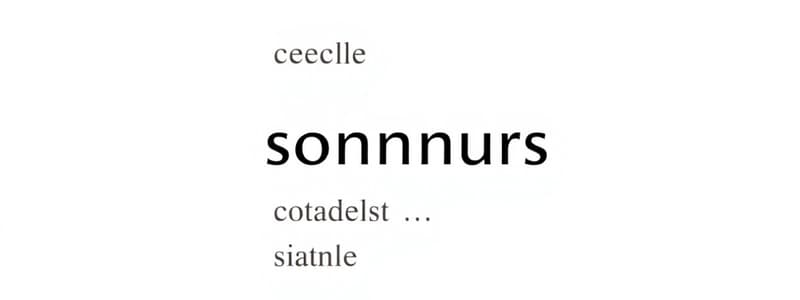Podcast
Questions and Answers
What is a synonym?
What is a synonym?
- A word that is spelled similarly but means differently
- A word with a similar sound
- A word that means the opposite
- A word that has the same meaning as another (correct)
Which of these options represents an antonym of 'day'?
Which of these options represents an antonym of 'day'?
- night (correct)
- sunlight
- afternoon
- morning
What is indicated when the stress is on the last syllable of a word?
What is indicated when the stress is on the last syllable of a word?
- Monosyllable
- Esdrújula accent
- Acute accent (correct)
- Grave accent
Which term describes a word with only one syllable?
Which term describes a word with only one syllable?
Which of the following is an example of a 3rd person singular subject?
Which of the following is an example of a 3rd person singular subject?
What is a diptongo?
What is a diptongo?
Which of the following is an example of a hiato?
Which of the following is an example of a hiato?
Which tense is formed by only one word?
Which tense is formed by only one word?
What type of word is 'Matías' classified as?
What type of word is 'Matías' classified as?
What does a calificativo adjective indicate?
What does a calificativo adjective indicate?
What is an example of a collective noun?
What is an example of a collective noun?
Which of the following is a proper noun?
Which of the following is a proper noun?
What type of adjective is 'German' in the context of nouns?
What type of adjective is 'German' in the context of nouns?
Identify the abstract noun from the following options.
Identify the abstract noun from the following options.
Which of the following lists includes only common nouns?
Which of the following lists includes only common nouns?
What is the main purpose of Model 1?
What is the main purpose of Model 1?
What aspect of language does Model 2 primarily address?
What aspect of language does Model 2 primarily address?
Which characteristic of subjects is highlighted in Model 3?
Which characteristic of subjects is highlighted in Model 3?
In Model 4, the focus is on the order of what elements?
In Model 4, the focus is on the order of what elements?
What do modifiers do according to Model 5?
What do modifiers do according to Model 5?
Flashcards are hidden until you start studying
Study Notes
Context and Synonyms
- Identifying the meaning of words in text is key.
- Synonyms are words that have the same meaning as other words, but different spelling. Example: upset = irritated
- Antonyms are words with opposite meanings. Example: day, night
Accidents of Grammar
- Person: Describes who is speaking or being spoken to (1st, 2nd, 3rd person)
- Number: Indicates singular or plural subjects
- Time: Refers to the time frame of an action
- Mood: Expresses the speaker’s attitude towards the statement, for example, indicative, subjunctive, imperative
Action Verbs
- Action verbs describe actions performed (eating, being, blooming)
Grammatical Accidents
- These are grammatical elements.
Accents
- Acute: Stress falls on the last syllable (e.g. colibri, look, listen)
- Grave: Stress falls on the second to last syllable (e.g. angel, celeste, martes)
- Esdrújula: Stress falls on the third to last syllable (e.g. página, lírico, específico)
Monosyllables
- Words with only one syllable (e.g. te, el)
Example Conjugations
- "Amaba - temia" (Past Imperfect)
- "temí - partí" (Future Simple)
News
- A news article is an objective account of an event.
Vocal Concurrences
-
Diphthong: Two vowels combined in one syllable (e.g. viaje, guante)
-
Hiatus: Two vowels in separate syllables (e.g. real, país)
-
Triphthong: Three vowels in one syllable (e.g. miau, Uruguay)
-
The letter "h" between vowels does not prevent a diphthong from forming
Verb Moods
- Indicative: Expresses actions that are real, or hypothetical possibilities, or even commands.
Verb Tenses
- Simple Tenses: Formed with one word
- Present: amar
- Past Imperfect: amaba
- Past Perfect Simple: amé
- Future Simple: amaré
- Conditional Simple: amaría
- Compound Tenses: Formed with two words
- Past Perfect Compound: He amado
- Past Pluperfect: Había amado
- Future Compound: Habré amado
- Conditional Compound: Habría amado
Word Classes
- Nominal:
- Proper Noun: Matías (specific person, place, or thing)
- Common Noun: Canción (general category)
- Concrete Noun: Lápiz (tangible)
- Abstract Noun: Felicidad (intangible)
- Individual Noun: Perro, gato (single entity)
- Collective Noun: Jauría (group of entities)
- Verbal:
- Modifiers:
Adjectives
- Qualifying Adjectives: Indicative of a quality, descriptive.
- Gentilic Adjectives: Indicate place of origin (German, Argentinian, etc.)
- Numeral Adjectives: Indicate quantity (three, four, five)
Other Details
- "Notoria" (referring to a type of article) is considered “informative.”
- There is a section on types of words.
Module 1
- Competence: Briefly summarize and anticipate the content of a text.
- Summary: A concise summary of the beginning of a story.
- Tables: Tables display the textual information.
Nouns
- Proper Nouns: Matias, Mexico (specific persons, places, or things)
- Common Nouns: Song, map (general categories)
- Concrete Nouns: Pencil, table (tangible)
- Abstract Nouns: Happiness, sweetness (intangible)
- Individual/Dual Nouns: Dog, fish (single entity)
- Collective Nouns: Group, flock, collection (groups of entities)
Adjectives
- Qualifying Adjectives: Explain qualities of nouns.
- Descriptive/National Adjectives: German, Argentinian, etc.
- Numerals: 1, 2, 3, 4, 5, etc.
Models
- The document describes different models.
- The document appears to be notes on grammar rules or similar linguistic topics.
Model 1
- Extended analysis is the goal.
- Adjectives are categorized.
- Nouns are described.
- Verbal form is discussed in different contexts.
Model 2
- Focus is on structure and verbal usage.
- Subjects are covered.
- Pronouns, and their placement, are discussed.
- Subject-verb agreement is explicitly mentioned.
- Different kinds of predicates explained.
- Word order covered.
- Sentence structure explained.
Model 3
- The Sard Model has subjects that might not be explicitly visible.
- Placement of subjects is discussed.
Model 4
- Peacocks generally follow PVS, but the order depends on verbs and starts from verbs.
Model 5
- Modifiers provide additional information to the core element.
- Prepositional phrases are examples, "in time", "with place", etc.
- Complementary circumstantial modifiers indicate time.
Studying That Suits You
Use AI to generate personalized quizzes and flashcards to suit your learning preferences.



